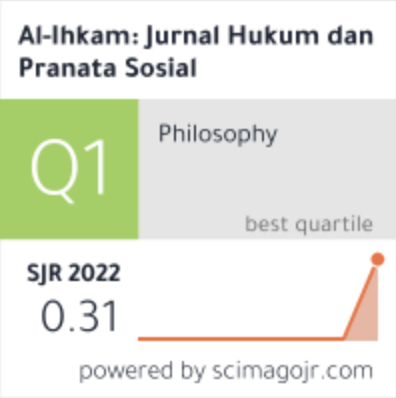TINGKAT PENGGUNAAN MULTI AKAD DALAM FATWA DEWAN SYARI’AH NASIONAL–MAJELIS ULAMA INDONESIA (DSN-MUI)
 Abstract views: 633
,
Abstract views: 633
,
 PDF downloads: 384
PDF downloads: 384
Abstract
Abstrak:
Artikel ini bermula dari persoalan tentang hukum multi akad dan level penggunaannya dalam fatwa DSN-MUI (Dewan Syari’ah Nasional Majelis Ulama Indonesia). Untuk menganalisis persoalan tersebut, penulis menggunakan jenis penelitian hukum normatif (normatie legal research) dengan pendekatan konseptual. Fakta bahwa fatwa DSN-MUI banyak mengadopsi akad-akad baik yang bersifat tunggal maupun multi (al-’uqûd al-murakkabah). Multi akad ada yang bersifat alamiah (al-‘uqûd al-murakkabah al-thabî’îyah) dan hukumnya diperbolehkan. Sedangkan multi akad hasil modifikasi (al-‘uqûd al-murakkabah al-ta’dîlah) hukumnya masih tergantung dari bagaimana bentuk modifikasinya. Jika modifikasi akad tidak melanggar prinsip Sunnah tentang penggabungan akad, maka hukumnya diper- bolehkan. Begitu pula sebaliknya, jika terjadi penggabungan akad se- hingga terdapat keterkaitan (mu’allaq), maka haram hukumnya. Dari total akad yang diadopsi dalam fatwa DSN-MUI, ada sekitar 60,68 % yang menggunakan akad secara tunggal dan sisanya 39,32 % melalui pendekatan multi akad agar dapat diterapkan dalam transaksi modern.
Abstract:
This article begins from issues of the law of hybrid contracts and the level of their using in the fatwa of DSN-MUI (National Sharia Board – Assembly of Indonesian Ulama). To analyze these issues, I use a normative legal research with a conceptual approach. The fact that the fatwa of DSN-MUI has adopted many contracts (al-‘uqûd) both in single form and hybrid contract (al-'uqûd al-murakkabah). There are two hybrid contracts namely that natural (al-'uqûd al-murakkabah al-thabî'îyah) is permissible, while law of hybrid contracts modified (al-'uqûd al-murakkabah al-ta'dîlah) is still depend on how to modify it. If the modification of the contracts does not violate the principle of hadith, then it is permissible. Otherwise, if there is a melting of contracts causing inter connected each others (mu'allaq) it is unlawful. Of the total contract is absorbed, there were approximately 60.68% using singgle contract and the remaining 39.32% using hybrid contract to be applied in modern transactions.
Downloads
References
Agustianto, Hybrid Contract dalam Keuangan Syariah. http://www.agustiantocentre.com/?p=68 (Diakses tanggal 24 Maret 2016)
Anwar, Syamsul, Hukum Perjanjian Syariah: Studi tentang Teori Akad dalam Fikih Muamalat. Jakarta: Rajawali Pers, 2007.
Amin, Ma’ruf, et.al. Himpunan Fatwa MUI Sejak Tahun 1975. Jakarta: Erlangga, 2011.
Amiruddin dan Asikin, Zainal. Pengantar Metode Penelitian Hukum. Jakarta: Rajawali Pers, 2003.
Hamshî, Lînah al-. Târîkh al-Fatwâ fî al-Islâm wa Ahkâmuhâ al-Syar’iyah. Beirut: Dâr al-Rasyîd, 1417 H.
Imrânî, Abd Alâh al-. al-‘Uqûd al-Mâliyah al-Murakkabah: Dirâsat Fiqhiyah Ta’shiliyah wa Tathbîqiyah. Riyadh: Esbelia, 1431 H.
Jâbî, Biâm Abd al-Wahâb al-. Adâb al-Fatwâ wa al-Muftî wa al-Mustaftî. Kairo: Dâr al--Fikri, 1988 M.
Maqrî, Ali al-Fayumi al-. Al-Misbâh al-Munîr. Beirut: Maktabah Lebanon, 1987.
Dewan Syari’ah Nasional Majelis Ulama Indonesia. Sistem dan Prosedur Penetapan Fatwa. Jakarta: Pustaka DSN-MUI, 2006.
Hasanuddin. Konsep dan Standar Multi Akad dalam Fatwa Dewan Syariah Nasional Majelis Ulama Indonesia (DSN-MUI). Jakarta: Sekolah Pascasarjana UIN Syarif Hidayatullah, 2008.
Hammâd, Nazîh. al-‘Uqûd al-Murakkabah fî al-Fiqh al-Islâmî. Damaskus: Dar al-Qalam, 2005 M.
Humâm, Ibn. Fath al-Qadîr. Beirut: Dâr al-Kitab al-Ilmiyah, 1424 H.
Mas’adi, Ghufron A. Fiqh Muamalah Kontekstual. Jakarta: Rajawali Pers, 2002.
Peraturan Mahkamah Agung Nomor 2 Tahun 2008 tentang Kompilasi Hukum Ekonomi Syari’ah
Qâsimî, Muhammad Jamâl al-Dîn al-. al-Fatwâ fî Islâm. Beirut: Dâr al-Kitab al-Ilmiyah, 1986 M.
S, Burhanuddin. Hukum Kontrak Syariah. Yogyakarta: BPFE UGM, 2009.
Syarbâshî, Ahmad. Mu’jam al-Iqtishâdî al-Islâmî. Saudi Arabia: Dâr al-Jayl, 1401 H .
Zarqâ, Mushtafâ Ahmad. al-Madkhal al-Fiqh al-‘Âmm. Beirut: Dâr al-Qalam, 1425 H.
Zuhaylî, Wahbah al-. Al-Fiqh al-Islâmī wa Adillatuhu. Beirut: Dâr al-Fikr, 1406 H.
In order to be accepted and published by Al-Ihkam: Jurnal Hukum dan Pranata Sosial, author(s) submitting the article manuscript should complete all the review stages. By submitting the manuscript, the author(s) agreed to the following terms:
- The copyright of received articles shall be assigned to Al-Ihkam: Jurnal Hukum dan Pranata Sosial as the publisher of the journal. The intended copyright includes the right to publish articles in various forms (including reprints). Al-Ihkam: Jurnal Hukum dan Pranata Sosial maintain the publishing rights to the published articles.
- Authors are permitted to disseminate published articles by sharing the link/DOI of the article at Al-Ihkam: Jurnal Hukum dan Pranata Sosial. Authors are allowed to use their articles for any legal purposes deemed necessary without written permission from Al-Ihkam: Jurnal Hukum dan Pranata Sosial with an acknowledgment of initial publication to this journal.
- Users/public use of this website will be licensed to CC-BY-SA.



.png)
_1.png)










